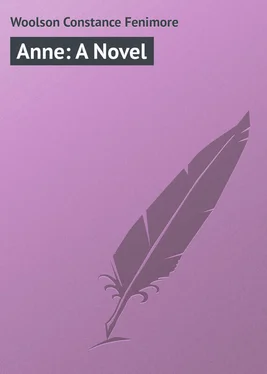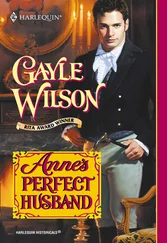Constance Woolson - Anne - A Novel
Здесь есть возможность читать онлайн «Constance Woolson - Anne - A Novel» — ознакомительный отрывок электронной книги совершенно бесплатно, а после прочтения отрывка купить полную версию. В некоторых случаях можно слушать аудио, скачать через торрент в формате fb2 и присутствует краткое содержание. Жанр: Классический детектив, foreign_detective, foreign_prose, на английском языке. Описание произведения, (предисловие) а так же отзывы посетителей доступны на портале библиотеки ЛибКат.
- Название:Anne: A Novel
- Автор:
- Жанр:
- Год:неизвестен
- ISBN:нет данных
- Рейтинг книги:5 / 5. Голосов: 1
-
Избранное:Добавить в избранное
- Отзывы:
-
Ваша оценка:
- 100
- 1
- 2
- 3
- 4
- 5
Anne: A Novel: краткое содержание, описание и аннотация
Предлагаем к чтению аннотацию, описание, краткое содержание или предисловие (зависит от того, что написал сам автор книги «Anne: A Novel»). Если вы не нашли необходимую информацию о книге — напишите в комментариях, мы постараемся отыскать её.
Anne: A Novel — читать онлайн ознакомительный отрывок
Ниже представлен текст книги, разбитый по страницам. Система сохранения места последней прочитанной страницы, позволяет с удобством читать онлайн бесплатно книгу «Anne: A Novel», без необходимости каждый раз заново искать на чём Вы остановились. Поставьте закладку, и сможете в любой момент перейти на страницу, на которой закончили чтение.
Интервал:
Закладка:
In the mean time young Pronando was growing into manhood at the rate of a year in a month. His handsome face, fine bearing, generous ways, and incessant activity both of limb and brain gave him a leader's place among the Western students, who studied well, were careless in dress and manner, spent their money, according to the Western fashion, like princes, and had a peculiar dry humor of their own, delivered with lantern-jawed solemnity.
Young Pronando's preparation for college had been far better than that of most of his companions, owing to Dr. Gaston's care. The boy apprehended with great rapidity – apprehended perhaps more than he comprehended: he did not take the time to comprehend. He floated lightly down the stream of college life. His comrades liked him; the young Western professors, quick, unceremonious, practical men, were constantly running against little rocks which showed a better training than their own, and were therefore shy about finding fault with him; and the old president, an Eastern man, listened furtively to his Oxford pronunciation of Greek, and sighed in spite of himself and his large salary, hating the new bare white-painted flourishing institution over which he presided with a fresher hatred – the hatred of an exile. For there was not a tree on the college grounds: Young America always cuts down all his trees as a first step toward civilization; then, after an interregnum, when all the kings of the forest have been laid low, he sets out small saplings in whitewashed tree-boxes, and watches and tends them with fervor.
Rast learned rapidly – more things than one. The school for girls, which, singularly enough, in American towns, is always found flourishing close under the walls of a college, on the excellent and heroic principle, perhaps, of resisting temptation rather than fleeing from it, was situated here at convenient distance for a variety of strict rules on both sides, which gave interest and excitement to the day. Every morning Miss Corinna Haws and her sister girded themselves for the contest with fresh-rubbed spectacles and vigilance, and every morning the girls eluded them; that is, some of the girls, namely, Louise Ray and Kate and Fanny Meadows, cousins, rivals, and beauties of the Western river-country type, where the full life and languor of the South have fused somewhat the old inherited New England delicacy and fragile contours. These three young girls were all interested in handsome Rast in their fanciful, innocent, sentimental way. They glanced at him furtively in church on Sunday; they took walks of miles to catch a distant glimpse of him; but they would have run away like frightened fawns if he had approached nearer. They wrote notes which they never sent, but carried in their pockets for days; they had deep secrets to tell each other about how they had heard that somebody had told somebody else that the Juniors were going to play ball that afternoon in Payne's meadow, and that if they could only persuade Miss Miriam to go round by the hill, they could see them, and not so very far off either, only two wheat fields and the river between. Miss Miriam was the second Miss Haws, good-tempered and – near-sighted.
That the three girls were interested in one and the same person was part of the pleasure of the affair; each would have considered it a very dreary amusement to be interested all alone. The event of the summer, the comet of that season's sky, was an invitation to a small party in the town, where it was understood that young Pronando, with five or six of his companions, would be present. Miss Haws accepted occasional invitations for her pupils, marshalling them in a bevy, herself robed in pea-green silk, like an ancient mermaid: she said that it gave them dignity. It did. The stern dignity and silence almost solemn displayed by Rast's three worshippers when they found themselves actually in the same room with him were something preternatural. They moved stiffly, as if their elbows and ankles were out of joint; they spoke to each other cautiously in the lowest whispers, with their under jaws rigid, and a difficulty with their labials; they moved their eyes carefully everywhere save toward the point where he was standing, yet knew exactly where he was every moment of the time. When he approached the quadrille which was formed in one corner by Miss Haws's young ladies, dancing virginally by themselves, they squeezed each others' hands convulsively when they passed in "ladies' chain," in token of the great fact that he was looking on. When, after the dance, they walked up and down in the hall, arm in arm, they trod upon each other's slippers as sympathetic perception of the intensity of his presence on the stairs. What an evening! How crowded full of emotions! Yet the outward appearance was simply that of three shy, awkward girls in white muslin, keeping close together, and as far as possible from a handsome, gay-hearted, fast-talking youth who never once noticed them. O the imaginative, happy, shy fancies of foolish school-girls! It is a question whether the real love which comes later ever yields that wild, fairy-like romance which these early attachments exhale; the very element of reality weights it down, and makes it less heavenly fair.
At the end of the summer Rast had acquired a deep experience in life (so he thought), a downy little golden mustache, and a better opinion of himself than ever. The world is very kind to a handsome boy of frank and spirited bearing, one who looks as though he intended to mount and ride to victory. The proud vigor of such a youth is pleasant to tired eyes; he is so sure he will succeed! And most persons older, although knowing the world better and not so sure, give him as he passes a smile and friendly word, and wish him godspeed. It is not quite fair, perhaps, to other youths of equal merit but another bearing, yet Nature orders it so. The handsome, strong, confident boy who looks her in the face with daring courage wins from her always a fine starting-place in the race of life, which seems to advance him far beyond his companions. Seems; but the end is far away.
Rast did not return to the island during the summer vacation; Dr. Gaston wished him to continue his studies with a tutor, and as the little college town was now radiant with a mild summer gayety, the young man was willing to remain. He wrote to Anne frequently, giving abstracts of his life, lists of little events like statistics in a report. He did this regularly, and omitted nothing, for the letters were his conscience. When they were once written and sent, however, off he went to new pleasures. It must be added as well that he always sought the post-office eagerly for Anne's replies, and placed them in his pocket with satisfaction. They were sometimes unread, or half read, for days, awaiting a convenient season, but they were there.
Anne's letters were long, they were pleasant, they were never exciting – the very kind to keep; like friends who last a lifetime, but who never give us one quickened pulse. Alone in his room, or stretched on the grass under a tree, reading them, Rast felt himself strongly carried back to his old life on the island, and he did not resist the feeling. His plans for the future were as yet vague, but Anne was always a part of his dream.
But this youth lived so vigorously and fully and happily in the present that there was not much time for the future and for dreams. He seldom thought. What other people thought, he felt.
CHAPTER VI
"Into the Silent Land!
Ah! who shall lead us thither?
Clouds in the evening sky more darkly gather,
And shattered wrecks lie thicker on the strand.
Who leads us with a gentle hand
Thither, O thither,
Into the Silent Land?
"O Land, O Land,
For all the broken-hearted,
The mildest herald by our fate allotted
Beckons, and with inverted torch doth stand
To lead us with a gentle hand
To the land of the great Departed —
Into the Silent Land!"
Интервал:
Закладка:
Похожие книги на «Anne: A Novel»
Представляем Вашему вниманию похожие книги на «Anne: A Novel» списком для выбора. Мы отобрали схожую по названию и смыслу литературу в надежде предоставить читателям больше вариантов отыскать новые, интересные, ещё непрочитанные произведения.
Обсуждение, отзывы о книге «Anne: A Novel» и просто собственные мнения читателей. Оставьте ваши комментарии, напишите, что Вы думаете о произведении, его смысле или главных героях. Укажите что конкретно понравилось, а что нет, и почему Вы так считаете.












